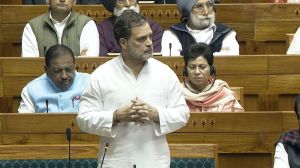Finance Minister Nirmala Sitharaman Saturday said that agriculture was one of the four engines driving India’s development journey and announced several new initiatives for the sector, including the Prime Minister Dhan-Dhaanya Krishi Yojana, in the Union Budget 2025-26. However, the overall allocation to the Ministry of Agriculture and Farmers’ Welfare saw an increase of barely 4 per cent — from Rs 1.32 lakh crore in the last budget to Rs 1.37 lakh crore.
Sitharaman also announced a comprehensive programme for vegetables and fruits; a Makhana Board, which will be set up in Bihar; and a national mission on high yielding seeds.

“Motivated by the success of the Aspirational Districts Programme, our government will undertake a ‘Prime Minister Dhan-Dhaanya Krishi Yojana’ in partnership with states. Through the convergence of existing schemes and specialised measures, the programme will cover 100 districts with low productivity, moderate crop intensity and below-average credit parameters,” Sitharaman said in her budget speech.
The scheme aims to increase agricultural productivity, adopt crop diversification and sustainable agriculture practices, improve post-harvest storage after harvest at the panchayat and block levels, improve irrigation facilities, and provide short-term and long-term credit, she explained, adding that it was likely to help 1.7 crore farmers.
Sitharaman also announced an initiative for building rural prosperity and resilience. “This will address under-employment in agriculture through skilling, investment, technology, and invigorating the rural economy. The goal is to generate ample opportunities in rural areas so that migration is an option, but not a necessity…The programme will focus on rural women, young farmers, rural youth, marginal and small farmers, and landless families,” she said.
“Global and domestic best practices will be incorporated and appropriate technical and financial assistance will be sought from multilateral development banks. In Phase 1, 100 developing agri-districts will be covered,” Sitharaman added.
While no separate allocation has been made for the Prime Minister Dhan-Dhaanya Krishi Yojana, Rs 1,000 crore has been allocated for the mission for pulses, Rs 500 crore for the mission for vegetables and fruits, Rs 100 crore support for the Makhana Board, Rs 100 crore for the mission on hybrid seeds, and Rs 500 crore for the cotton technology mission.
Story continues below this ad
Six-year self-sufficiency mission for pulses
Sitharaman announced a six-year mission for pulses to ensure self-sufficiency of tur (arhar), urad, and masoor. “Ten years ago, we made concerted efforts and succeeded in achieving near self-sufficiency in pulses. Farmers responded to the need by increasing the cultivated area by 50 per cent and government arranged for procurement and remunerative prices. Since then, with rising incomes and better affordability, our consumption of pulses has increased significantly…Our Government will now launch a six-year ‘Mission for Aatmanirbharta in Pulses’ with a special focus on tur, urad and masoor,” she said.
“Central agencies (NAFED and NCCF) will be ready to procure these three pulses, as much as offered during the next four years from farmers who register with these agencies and enter into agreements,” Sitharaman said.
Sitharaman’s announcement on pulses has provisions similar to those offered by the Union ministers to the protesting farmers in Punjab during a meeting at Chandigarh last year. The Union ministers had assured the farmers that the government’s cooperative agencies, including National Cooperative Consumers’ Federation of India and National Agricultural Cooperative Marketing Federation of India, will procure arhar, urad and moong at minimum support price (MSP).
National mission on seeds
Sitharaman said a National Mission on High Yielding Seeds will be launched. This mission aims to enhance the research ecosystem, focus on developing and promoting seeds with high yields, pest resistance, and climate resilience, and make more than 100 seed varieties, released since July 2024, commercially available, she added.
Story continues below this ad
Targeting cotton productivity
Announcing a mission for cotton productivity, Sitharaman said, “For the benefit of lakhs of cotton growing farmers, I am pleased to announce a ‘Mission for Cotton Productivity’. This five-year mission will facilitate significant improvements in productivity and sustainability of cotton farming, and promote extra-long staple cotton varieties. The best of science and technology support will be provided to farmers. Aligned with our integrated 5F vision for the textile sector, this will help in increasing incomes of the farmers, and ensure a steady supply of quality cotton for rejuvenating India’s traditional textile sector.”
Enhancing loan limits for farmers
The finance minister also announced increasing the loan limit under the Modified Interest Subvention Scheme (MISS) from Rs 3 lakh to Rs 5 lakh. Currently, under MISS, farmers engaged in agriculture and other allied activities can acquire Kisan Credit Card (KCC) loans up to Rs 3 lakh at a benchmark rate of 9 per cent. However, the Centre provides 2 per cent interest subvention on the benchmark rate, bringing down the effective rate of interest to 7 per cent. An additional 3 per cent concession for prompt and timely repayment further reduces it to 4 per cent per year.
According to the agriculture ministry, the benefit of the interest subvention scheme is also available for post-harvest loans (for six months post-harvest) to small and marginal farmers having KCCs, with the aim of protecting them against distress sale of their produce. The Rs 3-lakh upper limit has remained unchanged since 2006-07, when the Interest Subvention Scheme, the original variant of MISS, was launched by then finance minister P Chidambaram. Several states, including Uttar Pradesh, had demanded an increase of the loan limit under the scheme.
To achieve self-sufficiency in urea fertilizer, the finance minister announced to set up a plant with an annual capacity of 12.7 lakh metric tons at Namrup in Assam.
Story continues below this ad
Budget allocation
Of the Rs 1.37 lakh crore allocated for the Ministry of Agriculture and Farmers’ Welfare for financial year 2025-26, Rs 1.27 lakh crore has been allocated to the Department of Agriculture and Farmers’ Welfare and Rs 10,466 crore for the Department of Agricultural Research and Education.
Among the big schemes for the agriculture ministry, the allocation for the PM-Kisan scheme has been kept at Rs 63,500 crore, similar to the revised estimates of financial year 2024-25 but higher than the Rs 60,000 crore budget estimates of the last financial year.
The budget of the Pradhan Mantri Fasal Bima Yojana has seen a cut from Rs 14,600 crore in the budget estimate and Rs 15,864 crore in revised estimates for financial year 2024-25 to Rs 12,242.27 crore in 2025-26.









